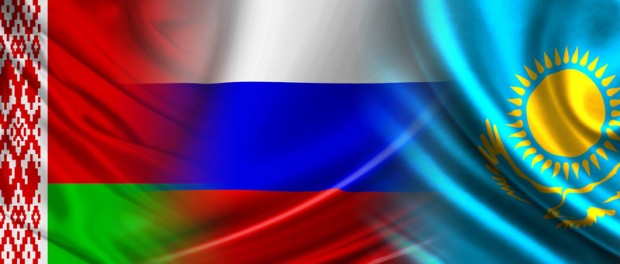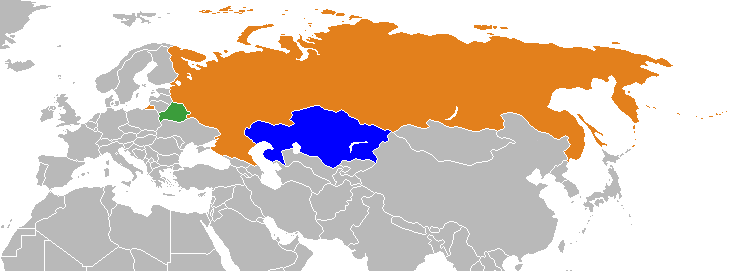Treaty of compromises
Belarus, Russia, and Kazakhstan signed a treaty forming the Eurasian Economic Union.
 Belarus, Russia, Kazakhstan flags
Belarus, Russia, Kazakhstan flags
Belarus managed to secure less than half of the total volume of export duties it had sought on oil products in its negotiations for taking part in the creation of the Eurasian Economic Union (EaEU). For 2015, the total amount of export duties the country will secure is estimated to be 1.5 billion USD of the 3.5 billion it had originally sought.
Nonetheless, the EaEU has become a reality. It represents the most extensive economic integration yet tried of former Soviet countries. Efforts toward its creation began in 2009. By this time, the “Troika” of the original participating states – Russia, Kazakhstan, and Belarus – had planned to complete the first two steps toward orderly reaching this goal: creation of a Customs Union (CU), and a Single Economic Space (SES). The reality, though, found problems that weren’t able to be solved, causing a failure of the first two steps. Nonetheless, supporters of integration are enthusiastic about reporting the creating of this new economic alliance (which may include Armenia and Kyrgyzstan by 2015, and Uzbekistan and Turkmenistan sometime after).
Indeed, the signed agreement creating the EaEU includes these previously-proposed economic agreements that had not been implemented. Because this new union was built on the foundation of the defective CU and SES, the agreement forced resolution of many of the problems that the “Troika” had been unable to resolve in earlier stages. Indeed, much to their credit, officials of the three countries worked very hard to reduce the huge list of exceptions and limitations, which had numbered 600 as of last autumn.
Despite the fanfare, the EaEU will not represent a single monetary, financial, or social system. It has not established a working suprnational controling body. Further, a number of important clauses in the agreement will require additional approval by the member states. Already the creation of a single common market for oil and gas has been rescheduled for 2025.
Meanwhile, for Belarus, the one key issue for its participation in the EaEU has been to create conditions for cost-free access to energy and a competitive environment for its suppliers. By negotiatinig for a share of the export duties on oil products, analysts calculated that Minsk could improve its balance of payments by up to 3.5 billion USD in additional budget revenue next year. Belarusian President Alexander Lukashenko clearly could not put his siganture on the EaEU agreement until he reached clarity on this point.
President Vladimir Putin, meanwhile, placed great importance in the new Economic Union (experts have called it “the brainchild of Putin”). This is evident in the fact that Russian officials had originally sought to withdraw additional subsidies for the country, and after signing the treaty establishing the EaEU, Russia promised Lukashenko that in 2015 the Belarus budget would retain 1.5 billion USD in export duties on oil products. In 2016, though, Lukashenko said after his meeting with Putin, “We will return to this issue, and I’m sure that within two years we will completely remove the difference and carry out trade in a civilized manner.”
The date in which the two presidents signed this key protocol for Belarus – the distribution of export duties on oil products – has not escaped media attention. It took place on May 29, the same day that the treaty establishing the EaEU was signed. Specifically, the two-party agreement allowed Belarus to collect export duties on its portion once oil, and certain categories of goods produced from oil, from anywhere within the “Troika” had left its territory for markets outside the EaEU, namely Europe.
Commenting on the protocol, Belarusian Deputy Finance Minister Dmitry Kiyko noted that in 2015, Belarus’ budget will receive 1.5 billion USD in export duty revenue on oil products. And the arrangement is designed for the long-term to cover the period before the establishment of a single market for petroleum and petroleum products, now projected to be achieved in 2025. In his turn, Eurasian Economic Commission (EEC) board member Sergei Rumas said that the 1.5 billion USD that Belarus will receive “demonstrates the first stage of entering the Eurasian relationship, ultimately without restrictions. From 2016, the parties may revise these figures in a major way.”
The protocol transfers to Belarus in 2015 a total of not less than 125 million USD in monthly export duties, with the rest of the revenue being sent to Russia. It further states that even if Belarus increases its take of motor fuel from the Russian market through pipelines running through its territory (in which case export duty is not charged), the Belarusian budget is still guaranteed this amount.
In 2013, Belarus had transferred a total of 3.3 billion USD in such export duties, down from 3.85 billion in 2012.
The split of the revenues for 2016 is still on the negotiating table. Now that the EaEU treaty is signed, bilateral compromises that affect the financial interests of the Russian Federation are anticipated to become much harder to reach. It wasn’t an accident that President Lukashenko held an important meeting of his government prior to his trip to Astana to sign the agreement creating the EaEU. The Belarusians very much sought to specify in an annex its position on all bilateral issues, in particular that of the export duties.
“We must make it clear to our partners,” Lukashenko said, “that if we are satisified with arrangements made on a bilateral basis, and if those arrangements are attached to this agreement, then we will be satisfied for the years 2014 and 2015. We will be quite grateful to be able to work as partners. If we do not reach an agreement in future years, and maybe we will not… in any case, we need to clearly identify and record our position if we are to reach bilateral agreeements. What is this economic union? This must be clearly and unambiguously spelled out to us, and then not criticized in any way that makes it appear we understand it differently, but rather that we understand it in (the agreed upon) way.”
Whether the Belarusian side initiated the applicxation to join the EaEU is still unknown. But in any case, negotiation for a larger portion of export duties by Belarus will be very difficult for a number of additional reasons. Russia faces an ongoing debate on tax policy in the oil sector. On May 27, Russian First Deputy Prime Minister Igor Shuvalov spoke about the proposed parameters for large-scale taxation of the oil industry, including reduction of duties on oil exports and increases on rates for the mineral resource extraction tax (MRET). The timing of these measures depends on the magnitude of the oil subsidy granted to Belarus. The Russian Ministry of Finance sought to get rid of these subsidies as quickly as possible and suggested that radical action be made on taxation for the oil industry, which could have led to a complete removal of the export duty as early as 2018.
However, this plan for accelerated changes to the tax regime does not enjoy the support of the Russian Ministry of Energy, which fears the consequences for the oil companies and the industry as a whole. Nevertheless, the discussion on taxation of the oil industry will continue in Russia, next at a meeting soon to be held by Prime Minister DmitryMedvedev, and then at a follow-up meeting of the presidential commission on the fuel and energy complex.
In addition to the other agreements, also assigned at Astana was signed a bilateral agreement regulating the delivery of Russian oil and oil products for export from Belarus. This regulates the long-term supply of oil to Belarusian refineries. In 2015, Belarus will receive 23 million tonnes (168.5 million barrels) of Russian oil, 22 million tonnes of which will arrive by pipeline. In subsequent years, shipments will increase by a further 1 million tonnes.
Belarus, in the meanwhile, was promised that it would receive as much oil as it requests under its negotiated arrangements. However, the fact that the supply of oil to countries within the economic union is still under a regulated quota is puzzling. These quotas are contrary to the very essence of an economic union.







Leave a comment